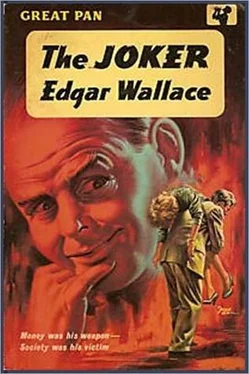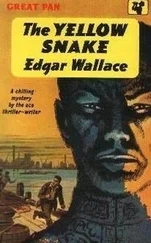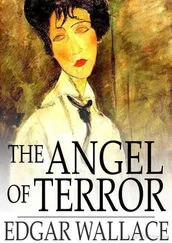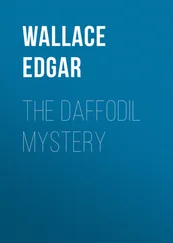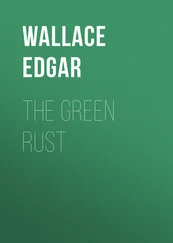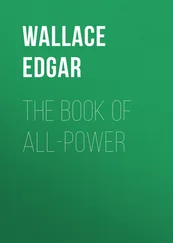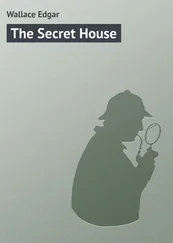Edgar Wallace - The Joker
Здесь есть возможность читать онлайн «Edgar Wallace - The Joker» весь текст электронной книги совершенно бесплатно (целиком полную версию без сокращений). В некоторых случаях можно слушать аудио, скачать через торрент в формате fb2 и присутствует краткое содержание. Год выпуска: 0101, Жанр: Старинная литература, на английском языке. Описание произведения, (предисловие) а так же отзывы посетителей доступны на портале библиотеки ЛибКат.
- Название:The Joker
- Автор:
- Жанр:
- Год:0101
- ISBN:нет данных
- Рейтинг книги:5 / 5. Голосов: 1
-
Избранное:Добавить в избранное
- Отзывы:
-
Ваша оценка:
- 100
- 1
- 2
- 3
- 4
- 5
The Joker: краткое содержание, описание и аннотация
Предлагаем к чтению аннотацию, описание, краткое содержание или предисловие (зависит от того, что написал сам автор книги «The Joker»). Если вы не нашли необходимую информацию о книге — напишите в комментариях, мы постараемся отыскать её.
The Joker — читать онлайн бесплатно полную книгу (весь текст) целиком
Ниже представлен текст книги, разбитый по страницам. Система сохранения места последней прочитанной страницы, позволяет с удобством читать онлайн бесплатно книгу «The Joker», без необходимости каждый раз заново искать на чём Вы остановились. Поставьте закладку, и сможете в любой момент перейти на страницу, на которой закончили чтение.
Интервал:
Закладка:
––––––––––––––––––––––––—
Title: The Joker (1926) Author: Edgar Wallace
CHAPTER 1
MR STRATFORD HARLOW was a gentleman with no particular call to hurry. By every standard he was a member of the leisured classes, and to his opportunities for lingering, he added the desire of one who was pertinently curious.
The most commonplace phenomena interested Mr Harlow. He had all the requisite qualities of an observer; his enjoyment was without the handicap of sentimentality, a weakness which is fatal to accurate judgement.
Leonardo da Vinci could stand by the scaffold using the dreadful floor as his desk; and sketch the agonies of malefactors given to the torture. Mr Harlow, no great lover of painters, thought well of Leonardo. He too could stop to look at sights which sent the average man shuddering and hurrying past; he could stop (even when he was really in a hurry) to analyse the colour scheme in an autumn sunset, not to rhapsodise poetically, but to mark down for his own information the quantities of beauty.
He was a large man of forty-eight, fair and slightly bald. His clean-shaven face was unlined, his skin without blemish. Pale blue eyes are not accounted beautiful and the pallor of Mr Harlow’s eyes was such that, seeing him for the first time, many sensitive people experienced a shock, thinking he was sightless. His nose was big and long, and of the same width from forehead to tip. He had very red, thick lips that seemed to be pouting even when they were in repose. A rounded chin with a dimple in the centre and unusually small cars, completes the description.
His powerful car was drawn up by the side of the road, its two near wheels on the green verge, and Mr Harlow sat, one hand on the wheel, watching the marshalling of the men in a field. In such moments of contemplative reveries as these, splendid ideas were born in Stratford Harlow’s mind, great schemes loomed out of the nowhere which is beyond vision. And, curiously enough, prisons invariably had this inspirational effect.
They were trudging now across the field, led by a lank warder, cheerful, sunburnt men in prison uniform.
Tramp! Tramp! Tramp!
The convicts had reached the hard road and were coming towards him. The leading warder glanced suspiciously at the well-dressed stranger, but the gang were neither abashed nor distressed by this witness of their shame. Rather, they carried themselves with a new perkiness as though conscious of their value as an unusual spectacle. The first two files glanced sideways and grinned in a friendly manner, half the third file followed suit, but the second man looked neither left nor right. He had a scowl on his face, a sneer on his thin lips and he lifted one shoulder in a shrug of contemptuous defiance, delivered, as the watcher realised, not so much towards the curious sightseer, but the world of free men which Mr Harlow represented.
Twisting round in his seat, he watched the little column filing through the Arch of Despair and out of sight through the gun-metal gates which he could not see.
The motorist stepped on the starter and brought the car round in a half-circle. Patiently he manoeuvred the long chassis until it headed back towards Princetown. Tavistock and Ellenbury could wait a day—a week if necessary. For here was a great thought to be shaped and exploited.
His car stopped noiselessly before the Duchy Hotel, and the porter came running down the steps.
‘Anything wrong, sir?’
‘No. I thought I’d stay another day. Can I have the suite? If not, any room will do.’
The suite was not let, he learnt, and he had his case carried upstairs.
It was then that he decided that Ellenbury, being within driving distance, might come across the moor and save him the tedium of a day spent in Tavistock. He picked up the telephone and in minutes Ellenbury’s anxious voice answered him.
‘Come over to Princetown. I’m staying at the Duchy. Don’t let people see that you know me. We will get acquainted in the smoke-room after lunch.’
Mr Harlow was eating his frugal lunch at a table overlooking the untidy square in front of the Duchy, when he saw Ellenbury arrive: a small, thin, nervous man, with white hair. Soon after the visitor came down to the big dining-room, gazed quickly round, located Mr Harlow with a start, and sat himself at the nearest table.
The dining-room was sparsely occupied. Two parties that had driven up from Torquay ate talkatively in opposite corners of the room. An elderly man and his stout wife sat at another table, and at a fourth, conveying a curious sense of aloofness, a girl. Women interested Mr Harlow only in so far as they were factors in a problem or the elements of an experiment; but since he must classify all things he saw, he noticed, in his cold-blooded fashion, that she was pretty and therefore unusual; for to him the bulk of humanity bore a marked resemblance to the cheap little suburban streets in which they lived, and the drab centres of commerce where they found their livelihood.
He had once stood at the corner of a busy street in the Midlands and had taken a twelve-hour census of beauty. In that period, though thousands upon thousands hurried past, he had seen one passably pretty girl and two that were not ill-favoured. It was unusual that this girl, who sat sidefaced to him, should be pretty; but she was unusually pretty.
Though he could not see her eyes, her visible features were perfect and her complexion was without flaw. Her hair was a gleaming chestnut and he liked the way she used her hands. He believed in the test of hands as a revelation of the mind. Her figure—what was the word? Mr Harlow pursed his lips. His was a cold and exact vocabulary, lacking in floweriness. ‘Gracious,’ perhaps. He pursed his lips again. Yes, gracious—though why it should be gracious…He found himself wandering down into the roots of language, and even as he speculated she raised her head slightly and looked at him. In profile she was pleasing enough, but now—
‘She is beautiful,’ agreed Stratford Harlow with himself, ‘but in all probability she has a voice that would drive a man insane.’
Nevertheless, he determined to risk disillusionment. His interest in her was impersonal. Two women, one young, one old, had played important parts in his life; but he could think of women unprejudiced by his experience. He neither liked nor disliked them, any more than he liked or disliked the Farnese vase, which could be admired but had no special utility.
Presently the waiter came to take away his plate. ‘Miss Rivers,’ said the waiter in a low voice, in answer to his query. ‘The young lady came this morning and she’s going back to Plymouth by the last train. She’s here to see somebody.’ He glanced significantly at Mr Harlow, who raised his bushy eyebrows.
‘Inside?’ he asked, in a low voice.
The waiter nodded. ‘Her uncle—Arthur Ingle, the actor chap.’
Mr Harlow nodded. The name was dimly familiar. Ingle?…Nosegay with a flower drooping out…and a judge with a cold in his head.
He began to reconstruct from his association of ideas.
He had been in court at the Old Bailey and seen the nosegay which every judge carries—a practice which had its beginning in olden times, when a bunch of herbs was supposed to shield his lordship from the taint of Newgate fever. As the judge had laid the nosegay on the ledge three little pimpernels in the centre had fallen on to the head of the clerk. Now he remembered! Ingle! An ascetic face distorted with fury. Ingle, the actor, who had forged and swindled, and had at last been caught. Mr Stratford Harlow laughed softly; he not only remembered the name but the man, and he had seen him that morning, scowling, and shrugging one shoulder as he slouched past in the field gang So that was Ingle! And he was an actor.
Читать дальшеИнтервал:
Закладка:
Похожие книги на «The Joker»
Представляем Вашему вниманию похожие книги на «The Joker» списком для выбора. Мы отобрали схожую по названию и смыслу литературу в надежде предоставить читателям больше вариантов отыскать новые, интересные, ещё непрочитанные произведения.
Обсуждение, отзывы о книге «The Joker» и просто собственные мнения читателей. Оставьте ваши комментарии, напишите, что Вы думаете о произведении, его смысле или главных героях. Укажите что конкретно понравилось, а что нет, и почему Вы так считаете.
